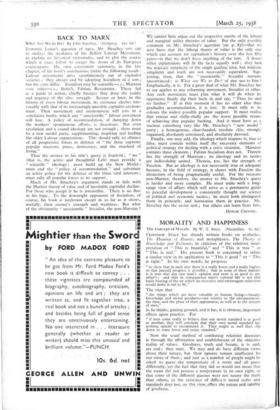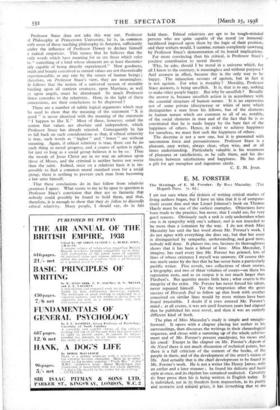MORALITY AND HAPPINESS
The Concept of Morals. By W. T. Stace. (Macmillan. 8s. 6d)
FROFESSOR STACE has already written hooks on aesthetics, The Meaning of Beauty, and metaphysics, The Theory of Knowledge and Existence, in criticism of the relativist inter- pretation of " This is beautiful," and " This is true " or
" This is real." His present book is concerned to refute a similar view in its application to " This is good " or " This is right." In his own words, he proposes
" to show that in each case there is a really lower and a really higher, so that [moral] progress is possible ; that in none of these matters is it true that any one man's opinion and taste is as good as any other's ; and that in consequence man's cultural life is not that futile beating of the air which an excessive and extravagant relativism would make it out to be."
The view that
" the things which are most valuable to human 'beings—beauty, knowledge and moral goodness—are relative to the circumstances, the time, and the place of their appearance, as well as to the natures of men," is, he thinks, gaining ground, and it has, it is obvious, important effects upon practice. - For " if men conic really to believe that one moral standard is as good as another, they will conclude that their own moral standard has nothing special to recommend it. They might as well then slip down to some lower and easier standard."
Now the usual method of combating relativist doctrines is through the affirmation and establishment of the objective reality of values. Goodness, truth and beauty, it is said, arc real ; they exist. We may and do have different views about their nature,= but., their natures remain unaffected by our views of than ; and just as a number of people might be asked to guess __the temperature of a room and all guess differently,- yet the fact that they did so would not mean that the room did not possess a temperature in its own right, or • that some of the different guesses were not nearer the mark than others, so the existence of different moral codes and
Professor Stace does not take this way out. Professor if Philosophy at Princetown University, he is, in--common with most of those -teaching' philosophy in America, sufficiently under the influence of Professor Dewey to declare himself a radical empiricist. This means that he believes that the only words which have meaning for us are those which refer to " something of a kind whose elements are at least theoretic; ally capable of being directly experienced." Now goodness, truth and beauty conceived as eternal values are not theoretically experienceable, at any rate by the senses of human beings.; therefore, on Professor Stace's view, they are meaningless. It follows that the notion of a universal system of morality binding upon all sentient creatures, upon Martians, as well as upon angels,- must be abandoned. So much Professor Stace concedes to the relativists. How, in the light of these concessions, are their conclusions to be disproved ?
There are a number of subtle logical arguments which may be used to show that the meaning of the statement " X is good " is never identical with the meaning of the statement " I happen to like X." Most of these, however, entail the notion that values are absolute and independent, which Professor Stace has already rejected. Consequently he h4s to fall back on such considerations as that, if ethical relativity is true, such words as " higher " and " lower " are without meaning. Again, if ethical relativity is true, there can be no such thing as moral progress, and a course of action is right, for just so long as a social group believes it to be so.' ThOs the morals of Jesus Christ are in no way an advance upon those of Moses, and the criminal is neither better nor worse than the saint. Indeed, since on a relativist basis it' is Uri- possible to find a common moral standard even for a social group, there is nothing to prevent each man from becoming a law unto himself. - That these conclusions do in fact follow from relativist premises I agree. What seems to me to be open to question is Professor Stace'S conviction that they are so fantastic thit nobody could possibly be found to hold them, and that, therefore, it is enough to show that they do follow to discredit ethical relativity. Many people, I should say, do in fah
hold them. Ethical relativists are apt to be tough-minded persons who are quite capable of' the moral' (or immoral) hardihood imposed upon them by the logic of their position, and their withers would, I surmise, remain completely unwrung by Professor Stace's demonstration of...its .horrid implications.
Far more convincing than his critical, is Professor Stace's positive contribution to moral theory.
Why, he asks, should I be moral in a universe which, for all I know to the contrary, is meaningless and without purpose ? And answers in effect, because this is the only way to be happy. The injunction savours of. egoism, but in fact it is not egoism. For what is morality ? Morality, Professor Stace answers, is being unselfish. It is, that is to say, seeking to make other people happy. 'But why be unselfish ? Broadly the answer is, because unselfish .action is in accordance with the essential structure Of human nature. - It is an expression not of some private idiosyncrasy or whim of taste which distinguishes a man from his fellows, but of the elements in human nature which are common to all of us, notably, of the social elements in man and of the fact that he is so constituted that he is made happy by the bare fact of the happiness of others. Hence, in order to achieve happiness for ourselves, we must first seek the happiness of others.
The doctrine is not ,a new one, but it is presented with uncommon force and persuasiveness. Professor Stace is a pleasant, easy. writer, always clear, often wise, and at all times understanding. Particularly. valuable is his treatment of pleasures or satisfactions, as he calls them, and his dis- tinction between satisfactions and happiness. He has also a gift for apt metaphor and ingenious simile.
C. E. M. JoAn.











































































 Previous page
Previous page